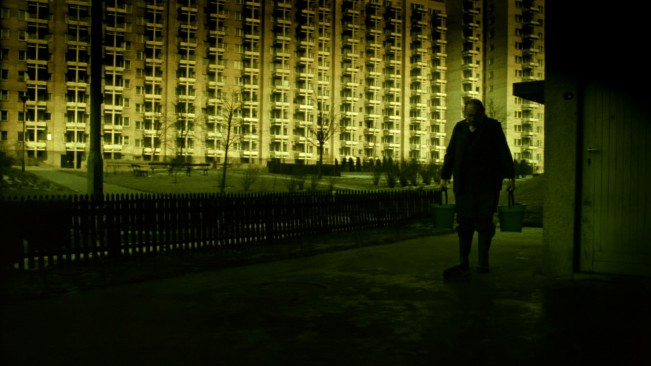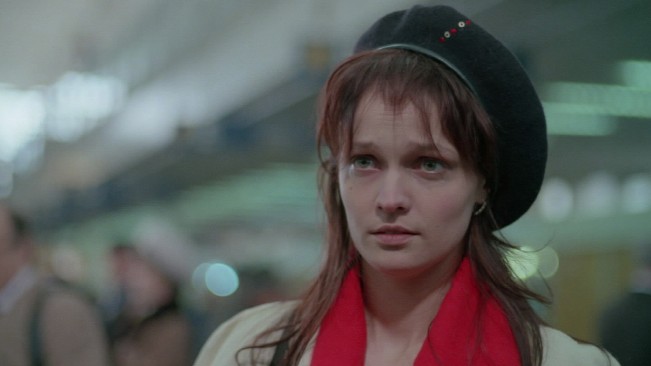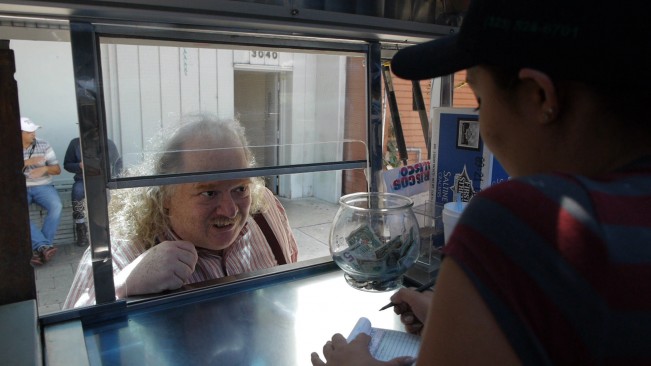

By Ray Pride Pride@moviecitynews.com
Pride, Unprejudiced: DEKALOG, THE NEON DEMON, CITY OF GOLD
Made for Polish television for 1988 broadcast, the ten short films of Krzysztof Kieslowski’s glorious masterpiece, Dekalog (Criterion Blu, $100), are loosely based on the ten commandments, loosely enough that the then-47-year-old filmmaker resisted identifying which installment was based on which commandment. (Two feature-length expansions, A Short Film About Killing and A Short Film About Love, are included on a separate disk.) Dekalog unfolds in a common setting, a large Warsaw housing project. Kieslowski, often a slippery or perverse interview subject, insisted that Dekalog was not a religious film. “I simply wanted to show that life is complicated. Nothing more.” In their simplest form, each of the ten episodes are about the diversity of failure that humans suffer as they try to give and receive love, rooted in the reality of the Poland of 1988. There’s a grave, serene beauty to each installment. They all exhibit the same dry deadpan as Three Colors: White (1994), a biting Polish wit. The key to the tenderness of Kieslowski’s film is how he allows interior states to be revealed through concrete gestures that resist interpretation. Kieslowski would have been 74 this year, and a little over twenty years after his death in his beloved Poland, Criterion has issued a Blu-ray edition, drawn from 4K digital restorations of the original 35mm negative.
Introducing the published screenplay in 1991, Stanley Kubrick, in the only blurb he ever provided, wrote, “I am always reluctant to single out some particular feature of the work of a major filmmaker because it tends inevitably to simplify and reduce the work. But in this book of screenplays by Krzysztof Kieslowski and his co-author, Krzysztof Piesiewicz, it should not be out of place to observe that they have the very rare ability to dramatize their ideas rather than just talking about them. By making their points through the dramatic action of the story they gain the added power of allowing the audience to discover what’s really going on rather than being told. They do this with such dazzling skill, you never see the ideas coming and don’t realize until much later how profoundly they have reached your heart.” (While Kieslowski reportedly said at the time his “retirement” after Three Colors: Red appeared at 1994’s Cannes Film Festival that he wanted time to think and smoke after 28 straight years of work, he actually was sidelined by heart trouble.)
In Dekalog One, a college professor’s young son has become fascinated with computers, trusting their calculations to help him understand the world around him. He’s a gorgeous, saucer-eyed brain-in-the-making, with more layers to him. Discovering a dead dog moves him to ask why people have to die at all.
“What is death?” the boy asks, eyes as clear as a brook. “The heart stops pumping blood,” his father answers. Father and son use the computer to make calculations on whether it will be safe for the son to ice skate the next day; yes, the computer says. Later, the father hears that several children have drowned in the lake, and he races to make sure his son was not one of them. Kieslowski’s direction, from performances to camera placement, from gestures to pacing, approaches perfection. He’s one of the few directors who built gainfully, personally, on Bresson’s use of the concrete and tactile, of simple gestures, to suggest spiritual conditions. In the first film alone, soured milk clouds a mug of coffee, children’s boots race over an ice-clad sidewalk, a housing project stands mute, filled with potential stories, against white snow and gray sky. A son kissing his father’s bald spot with his ball-point-lined face. Candle wax streams across an icon of the black Madonna. Tears. Not tears.
And in other segments: A murder victim’s foot fights free of a shoe, then its sock. A hangman arrives at work, hangs his jacket, puts a chair right, shoots his cuffs, oils the noose’s winch. A box of wooden matches blaze from a cigarette’s coal. A bee emerges along a spoon from thick lingonberry juice and flies. A drunk, naked, hosed down on Christmas Eve in the drunk tank, a Christmas tree beside him, moaning, “Where is my home?” A contortionist bends himself in the episodes; the same dog howls late at night through all.
Working with nine different cinematographers but largely within that single, unified location, Kieslowski examines the moral responsibility of doctors, the morality of abortion, lingering sexual obsession, adultery, incestuous urges, murder, capital punishment, voyeurism, fairy tales, Nazi collaboration, the Polish Underground, impotence, jealousy, illegal organ trade, punk rock, stamp collecting and simple greed.
Kieslowski slyly employs the commandments as a way to minimize the suffocating structure of traditional plots and to instead dive into things that actually delight him: patterns of chance, the paths of our lives, enigmatic expressions on fascinating faces, the way contemporary life is transacted in a bleak, late-Soviet city, all observed with a mildly sarcastic shrug. The result is hypnotic and sensual, a fragrant montage of mood and image unlike that of any other filmmaker working then (or now).
In the end, we are left with tenderness, ambiguity and a sense of the possibility of still being able to ask moral questions in everyday life. “I know it’s unfashionable these days,” Kieslowski said, “but I do believe in humanity. I believe in right and wrong, although it is difficult to talk about black and white in the times in which we live. But I think one is definitely better than the other and I do believe that people want to choose right—it is just that sometimes they are unable to do so.”
The first two times I saw Dekalog were on screen, including a 1996 Saturday afternoon press screening with only an afternoon lunch break. The 35mm print had been pried loose from its rights-holder, reportedly a Canadian-Polish woman who wanted a million dollars, an absurd price even then for a gargantuan arthouse meditation. Kieslowski had died only a few days earlier, and Gene Siskel, himself only a couple of years form passing, raged at Kieslowski’s “selfishness,” in not seeking medical help from those, like Harvey Weinstein, who reportedly would have gotten him the finest heart surgeons in Paris or New York City. How could Kieslowski have denied us more Kieslowski films was essentially his plaint. Several of us had lunches, a half dozen, and at this break halfway through, we then scurried into the hopeful March sun. We didn’t talk. We ate sandwiches and salad, nodded a lot, dazed but not yet sated.
This was “binge-ing” before the term, before the practice, and was wholly indulgent and completely narcotic. We could have had wine, but a few bites made for sufficient sustenance. Joe Dante recently rued that “Movies are a twentieth-century art form, and the twentieth century is over.” But a new generation of viewers can feast on Dekalog, a twentieth-century television series that could twenty-first century binge bliss, if only your heart can hold all the commotion, all the emotion, all the stark observation of humanity, withholding judgment like a mute god.
In an interview included among the extras, speaking to very young-sounding interlocutors, Kieslowski says that he found neither Three Colors nor Dekalog to be such big undertakings. “I didn’t know that they were that huge, he tells his young sounding interlocutors.” Chin on fist, a checkered shirt tucked under a dark blue sweater with his sleeves rolled up, Kieslowski gives the air of being the world’s most patient listener, even sniffling, visibly under the weather. “But the challenge was to interpret these universal and well-known words or slogans, or commandments, in the case of Dekalog. It’s a challenge to look at these things a bit differently.” He rued the interpretations that came before: “So much has been written it wouldn’t fit the shelves in this room.” The starting point was to reject all that literature. “We had the idea of turning every commandment into a challenge for a human bring. And can a human being meet that challenge? Is it even possible? Isn’t modern man in a situation where abiding by the commandments is practically impossible? It was about our increasingly complicated lives today. It was probably the same in days past and even ages ago. Is a human being strong enough? If a person knows what it is they should do, why do they do something else?”
Nicholas Winding Refn’s The Neon Demon (Broad Green Blu, $35) is minimalism and maximalism, a languorous rush of images and wall of music hangered onto a fairytale of an underage girl (Elle Fanning) who arrives in Los Angeles with hopes of becoming a model and then falls in with a perverse raft of archetypes atop waves of deep crimson imagery. Someone could look at this film and say, ‘These are only tableaux! Nothing’s going on.” But beauty is in the eye of the beholder: is all the sound and fury, the design and décor, the understated acting, is that…cinema? “I really like the way that you call it tableaux,” Refn told me in an interview at the film’s release, leaning into his flattery, “because you’re the only one that picked up on that.” [For more of that interview, go here.]
City Of Gold
“First we eat, then we do everything else,” Laura Gabbert epigraphs her engaging, toothsome, City of Gold (MPI DVD, $25), quoting culinary prose great M. F. K. Fisher. But her rich documentary is about one man, one of the four or five best stylists and pretty much the best eater on the contemporary food scene, Pulitzer Prize-winning dining writer Jonathan Gold. His love of the byways and side streets of the furthermost reaches of the Los Angeles brims articulately in each of his conversations and encounters. A genial, bearish, freckled man with thinning shoulder-length tresses, he’s the Gorgeous George of the Golden State, trundling in khakis and navy-blue sport coat into his aged jalapeno-green pickup. It’s hard to think of him in disguise before he gave up that pretense, first at LA Weekly, and now the Los Angeles Times. Plates large and mostly small color-corrected unto a breath of the breadth of flavor of its mostly hands-on makers, including his favored taco truck itinerant to downtown, Guerilla Tacos. “You’re not going to find cooking like this anywhere but L.A.,” he narrates from a review, and he spends his long nights and days providing the necessary evidence. Affably unpretentious but always grandly informed, Gold opines and divines his way across a complex city that he explores in unique and exemplary fashion. All critics should know their beat so well, and love it truly.


















